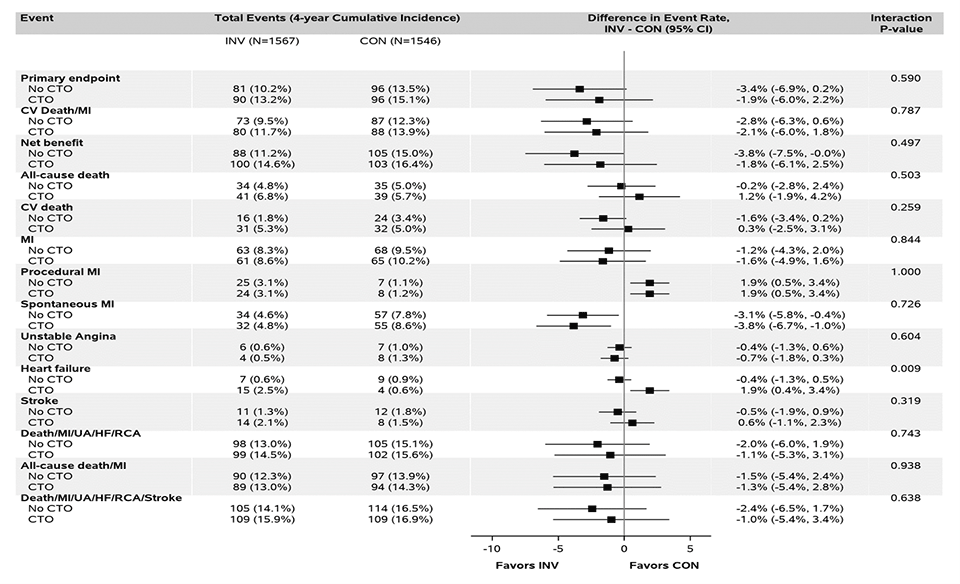News | TCTAP 2024
Implications of the ISCHEMIA Trial on Patient Selection for CTO-PCI
CTO-PCI: To Treat, or Not To Treat

Sripal Bangalore
New York University
Grossman School of Medicine, USA
At TCTAP 2024 in Incheon, Korea, Sripal Bangalore, MD (New York University School of Medicine, New York, USA) delved into the implications of the ISCHEMIA Trial on patient selection for chronic total occlusion percutaneous coronary intervention (CTO-PCI).
Historically, three major CTO trials, EXPLORE, EURO-CTO, and DECISION-CTO, have compared invasive and conservative treatments. Each of these trials failed to demonstrate a significant benefit in clinical outcomes, including death or myocardial infarction (MI) at 5 years.
Bangalore presented the results of the landmark ISCHEMIA Trial, which randomized 5,179 patients with stable angina and significant MI to either conservative or invasive treatment. Primary and secondary endpoints did not differ significantly between the two groups. Although mortality rates were similar, the invasive treatment arm exhibited reduced incidences of spontaneous MI, unstable angina, and cardiovascular-related hospitalizations. Additionally, symptomatic patients experienced faster and more sustained relief from angina with invasive treatment.
To address the question regarding the role of PCI in CTO management, Bangalore introduced the ISCHEMIA Trial CTO sub-study. This sub-study included 1,470 CTO patients identified via coronary computed tomography angiography (CCTA) and compared them with non-CTO counterparts. CTO patients tended to be younger with a higher prevalence of prior MI and heart failure, as well as moderate to severe ischemia on stress imaging. Clinical outcomes revealed inferior results for CTO patients, with higher rates of primary endpoints and cardiovascular mortality. Moreover, a comparison of conservative and invasive treatments within CTO or non-CTO groups yielded similar primary endpoint outcomes, with lower incidences of spontaneous MI observed in the invasive treatment arms, mirroring the overall ISCHEMIA trial findings (Figure 1).

Figure 1. Outcomes by treatment group and CTO status in ISCHEMIA Trial CTO sub-study
Concluding the lecture, Bangalore underscored the importance of treatment strategies for CTO patients. Drawing insights from all CTO trials and the ISCHEMIA CTO sub-study, the implementation of aggressive guideline-directed medical therapy was advocated for all CTO patients. Furthermore, judicious consideration of invasive treatment was suggested to enhance angina-related quality of life and mitigate the risk of spontaneous MI.
TCTAP Workshops
CTO-PCI: To Treat, or Not To Treat
Thursday, April 25, 10:30 AM ~ 12:22 PM
Valve & Endovascular Theater, Level 2
Edited by

Yong-Hoon Yoon, MD
Chungnam National University Sejong Hospital, Korea (Republic of)

Sripal Bangalore
New York University
Grossman School of Medicine, USA
At TCTAP 2024 in Incheon, Korea, Sripal Bangalore, MD (New York University School of Medicine, New York, USA) delved into the implications of the ISCHEMIA Trial on patient selection for chronic total occlusion percutaneous coronary intervention (CTO-PCI).
Historically, three major CTO trials, EXPLORE, EURO-CTO, and DECISION-CTO, have compared invasive and conservative treatments. Each of these trials failed to demonstrate a significant benefit in clinical outcomes, including death or myocardial infarction (MI) at 5 years.
Bangalore presented the results of the landmark ISCHEMIA Trial, which randomized 5,179 patients with stable angina and significant MI to either conservative or invasive treatment. Primary and secondary endpoints did not differ significantly between the two groups. Although mortality rates were similar, the invasive treatment arm exhibited reduced incidences of spontaneous MI, unstable angina, and cardiovascular-related hospitalizations. Additionally, symptomatic patients experienced faster and more sustained relief from angina with invasive treatment.
To address the question regarding the role of PCI in CTO management, Bangalore introduced the ISCHEMIA Trial CTO sub-study. This sub-study included 1,470 CTO patients identified via coronary computed tomography angiography (CCTA) and compared them with non-CTO counterparts. CTO patients tended to be younger with a higher prevalence of prior MI and heart failure, as well as moderate to severe ischemia on stress imaging. Clinical outcomes revealed inferior results for CTO patients, with higher rates of primary endpoints and cardiovascular mortality. Moreover, a comparison of conservative and invasive treatments within CTO or non-CTO groups yielded similar primary endpoint outcomes, with lower incidences of spontaneous MI observed in the invasive treatment arms, mirroring the overall ISCHEMIA trial findings (Figure 1).

Concluding the lecture, Bangalore underscored the importance of treatment strategies for CTO patients. Drawing insights from all CTO trials and the ISCHEMIA CTO sub-study, the implementation of aggressive guideline-directed medical therapy was advocated for all CTO patients. Furthermore, judicious consideration of invasive treatment was suggested to enhance angina-related quality of life and mitigate the risk of spontaneous MI.
TCTAP Workshops
CTO-PCI: To Treat, or Not To Treat
Thursday, April 25, 10:30 AM ~ 12:22 PM
Valve & Endovascular Theater, Level 2
Edited by

Yong-Hoon Yoon, MD
Chungnam National University Sejong Hospital, Korea (Republic of)

Leave a comment